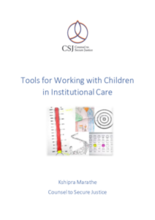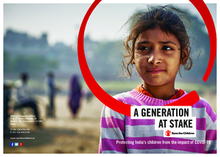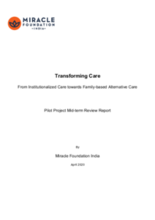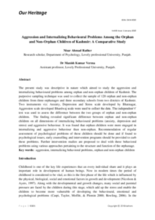childrens_living_arrangement
children_living_without_bio
Displaying 191 - 200 of 438
The 1st Care Leavers Convention being held from March 13 – 14, 2020 in India, is providing an opportunity for practioners, NGOs, professionals, researchers, students and organisations to showcase their research work, promising practices, good models and insights with Care Leavers.
The objective of this study is to understand the use of parental-group intervention for helping parents understand the problems of their children and to develop skills to deal with those problems.
This paper is a condensed version of a study entitled “Beyond 18: Leaving Child Care Institutions - Supporting Youth Leaving Care: A Study of Aftercare Practices in Five States of India”, which found that upon turning 18, youth transitioning out of child care institutions to independent life in India experience many challenges, such as securing housing and identity documents; accessing education, skill development, and employment opportunities; and garnering psychosocial support.
This knowledge resource discusses and provides examples of practice tools and calming techniques (in English and Hindi) which counsellors and adults can use while working with children who are in institutional care. The paper reviews evidence on the impact of institutionalisation on children as well as evidence-based interventions that can help mitigate this impact.
This study focuses on how the COVID-19 pandemic affects children aged 11-17 in India, including impacts on violence against children and social protection for children.
This Internal Mid Term Review (MTR) was conducted after completion of Year 1 of a pilot project to create a replicable model for child care institutions (CCIs) to effectively implement Family Based & Alternative Care in India.
All over the world, the pandemic has turned children's lives upside down. In this episode of Save the Children Documentary, they share their stories.
The present study aimed to study the aggression and internalizing behavioural problems among orphan and non-orphan children in Kashmir.
The Finding the Way Home documentary highlights the painful realities of the eight million children living in orphanages and other institutions around the world, telling the stories of six children in Brazil, Bulgaria, Haiti, Nepal, India and Moldova who have found their way into the care of loving families after spending periods of their lives in an institution.
The authors of this study conducted qualitative interviews of 69 caregivers in four countries: Ethiopia, Kenya, Cambodia, and India (Hyderabad and Nagaland), and across four religious traditions: Christian (Orthodox, Roman Catholic, and Protestant), Muslim, Buddhist, and Hindu. They asked respondents to describe the importance of religion for their becoming a caregiver, the way in which religion has helped them make sense of why children are orphans, and how religion helps them face the challenges of their occupation.





